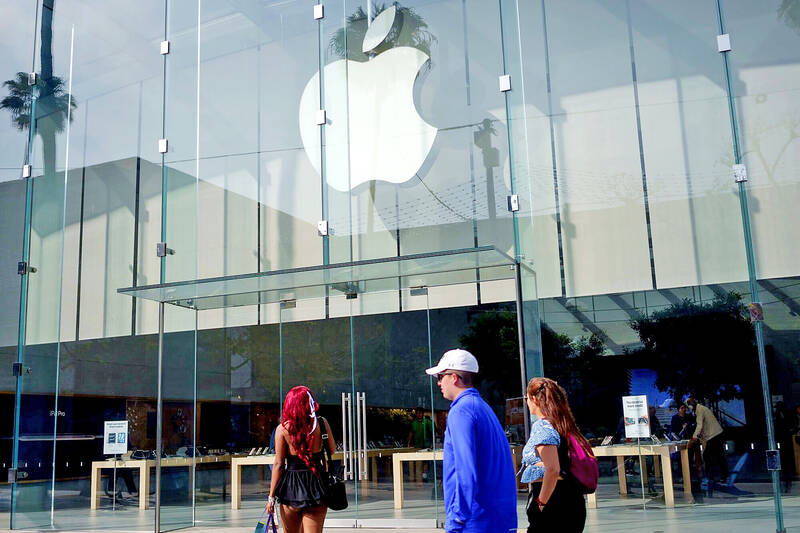Taiwanese law enforcement said that a Chinese Apple supplier has supposedly been operating illegally in Taiwan and has been trying to poach tech talent, and that a US-sanctioned Chinese firm had illegally set up operations in Taiwan.
Taiwan, which China claims as its own territory, has been stepping up efforts to stop what it views as underhanded and illegal activities by Chinese firms that are trying to steal know-how and poach talent.
The Ministry of Justice Investigation Bureau late on Thursday named Luxshare Precision Industry (立訊精密) as one of eight Chinese companies “that came to Taiwan to illegally engage in the poaching our high-tech talents.”

Photo: Bloomberg
The ministry did not give more details and Luxshare did not immediately respond to a request for comment.
Video surveillance equipment maker Zhejiang Dahua Technology Co (浙江大華技術股份有限公司), which the US added to a blacklist in 2019 over Beijing’s treatment of Muslim minorities in Xinjiang, was also on the list.
Zhejiang Dahua had set up “two private locations” in Taiwan and tried to circumvent the investigation by listing its employees under another company, the bureau said.
Zhejiang Dahua did not immediately respond to a request for comment.
Taiwan, home to Taiwan Semiconductor Manufacturing Co (台積電) and accounting for the majority of the world’s most advanced semiconductor manufacturing capacity, sees China’s efforts as a threat to its chip expertise.
“The facilitators of relevant mainland China companies in Taiwan should not be under any illusions and challenge the determination to enforce the law,” the bureau said, adding that it would “resolutely crack down on illegal business operations and the poaching of talent.”
The announcement on Thursday came after a sweep this month of Chinese tech companies that were suspected of conducting illegal operations.
Taiwanese prosecutors said that Luxshare allegedly stole commercial secrets from a Taiwanese competitor, Catcher Technology Co (可成科技), and poached its workforce to win orders from Apple.
Fourteen people have been charged, the prosecutors said.

PROTECTION: The investigation, which takes aim at exporters such as Canada, Germany and Brazil, came days after Trump unveiled tariff hikes on steel and aluminum products US President Donald Trump on Saturday ordered a probe into potential tariffs on lumber imports — a move threatening to stoke trade tensions — while also pushing for a domestic supply boost. Trump signed an executive order instructing US Secretary of Commerce Howard Lutnick to begin an investigation “to determine the effects on the national security of imports of timber, lumber and their derivative products.” The study might result in new tariffs being imposed, which would pile on top of existing levies. The investigation takes aim at exporters like Canada, Germany and Brazil, with White House officials earlier accusing these economies of

EARLY TALKS: Measures under consideration include convincing allies to match US curbs, further restricting exports of AI chips or GPUs, and blocking Chinese investments US President Donald Trump’s administration is sketching out tougher versions of US semiconductor curbs and pressuring key allies to escalate their restrictions on China’s chip industry, an early indication the new US president plans to expand efforts that began under former US president Joe Biden to limit Beijing’s technological prowess. Trump officials recently met with their Japanese and Dutch counterparts about restricting Tokyo Electron Ltd and ASML Holding NV engineers from maintaining semiconductor gear in China, people familiar with the matter said. The aim, which was also a priority for Biden, is to see key allies match China curbs the US

Teleperformance SE, the largest call-center operator in the world, is rolling out an artificial intelligence (AI) system that softens English-speaking Indian workers’ accents in real time in a move the company claims would make them more understandable. The technology, called accent translation, coupled with background noise cancelation, is being deployed in call centers in India, where workers provide customer support to some of Teleperformance’s international clients. The company provides outsourced customer support and content moderation to global companies including Apple Inc, ByteDance Ltd’s (字節跳動) TikTok and Samsung Electronics Co Ltd. “When you have an Indian agent on the line, sometimes it’s hard

‘SACRED MOUNTAIN’: The chipmaker can form joint ventures abroad, except in China, but like other firms, it needs government approval for large investments Taiwan Semiconductor Manufacturing Co (TSMC, 台積電) needs government permission for any overseas joint ventures (JVs), but there are no restrictions on making the most advanced chips overseas other than for China, Minister of Economic Affairs J.W. Kuo (郭智輝) said yesterday. US media have said that TSMC, the world’s largest contract chipmaker and a major supplier to companies such as Apple Inc and Nvidia Corp, has been in talks for a stake in Intel Corp. Neither company has confirmed the talks, but US President Donald Trump has accused Taiwan of taking away the US’ semiconductor business and said he wants the industry back